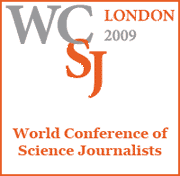The World Conference of Science Journalists
Interview with
Chris - Earlier this week, it was the World Conference of Science Journalists. Nearly a thousand science writers and broadcasters from all over the world got together in Westminster, not at the houses of Westminster, but down just the road from there, to help each other out and to share some ideas and here's Laura Soul to tell us a bit more.
 Laura - This week, London played host to the world's biggest conference for science journalists. Science writers and broadcasters from all corners of the globe gathered to discuss the challenges of reporting scientific stories in a media who are obsessed with celebrity and gossip. Sallie Robins, Conference Co-Director explained why this year's conference was particularly important.
Laura - This week, London played host to the world's biggest conference for science journalists. Science writers and broadcasters from all corners of the globe gathered to discuss the challenges of reporting scientific stories in a media who are obsessed with celebrity and gossip. Sallie Robins, Conference Co-Director explained why this year's conference was particularly important.
Sallie - The World Conference of Science Journalists is an international gathering of journalists from around the world. So, they can all come together and look at the profession of science journalism, what will happen in the future, how the jobs are changing, and who consider scientific issues that are key, right across the world. There's some parts in the world particularly in the United States, it does seem to be a profession in crisis, very few staff positions left in science journalism on newspapers, lots of newspapers folding all together. By contrast, in other parts of the world, we heard from an Arab science journalist and, you know, things are very much going on up there and in Africa. There's a bid increase in the profession. So, it's so quite interesting contrasts. So, I think a lot of people are interested to know where things probably go and what future might hold for them.
Laura - At first glance, it may seem the challenges for journalists in Africa have little in common with those in the West. But Ake Gimo from the Development Communications Network in Nigeria, feels that science reporting needs a global perspective.
Ake - There's a lot of commonalities when it comes to issues around the world. Issues of science is the essence of life and this is an opportunity to learn what's really going on and how do we address those issues. We think globally, but we have to act locally. That is the essence of the whole thing.
Laura - As well as facing future challenges, the conference was a chance to celebrate the success of journalists who've shaped the world. Andre Picard of Canada's Globe and Mail helped to expose one of Canada's biggest public health scandals.
Andre - I wrote about tainted-blood a lot. It's a story of blood that was infected with HIV and with hepatitis, and this became a big political scandal in Canada because of government in actions and cover-ups and document shredding related to this. But it started out as a medical issue, became a big social and political issue for us. What we found was the worst ever health scandal in Canada that about 4,000 people infected with HIV AIDS and more than 10,000 with hepatitis. So, very large numbers of people infected through a product that was supposed to save their lives which is blood and blood products.
Laura - This year's conference, saw delegates invited to London but the venue for the 2011 conference is somewhat more exotic. Cairo, Pallab Ghosh, BBC science correspondent and outgoing President of the World Federation of Science Journalists explained why Egypt was the top choice.
Pallab - Well, we had four really strong bids, Finland, Uganda, Kenya, and a joint bid by the Arab Science Foundation, and the American Science Association. It was a difficult choice but at the end of the day, one of the things that was important to the board was the culture that previous conferences it build which is about critical challenging science journalism. The value added that science journalist bring is to ask the awkward questions. We felt the vision provided by the joint U.S. and Arab bid would provide that.
Laura - As the host of the next conference becomes the president of the World Federation, Pallab passes his title on to Nadia El-Awady, who have high hopes for the Cairo conference.
Nadia - We're going to bring people to a different part of the world for this conference. For the past three conferences, it's been in the developed world. This will be a chance to bring people to a completely different part of the world where we're going to be representing the Arab world and Africa, we're going to be working closely with other Arab countries and other African countries. We really hope that the journalists when they come to the country and then hopefully, would be able to visit the region afterwards will find different kinds of stories to cover. They'll also be able to learn how we, as journalists in our part of the world work, what kind of challenges we face and how we overcome these challenges.
Laura - Delegates at the World Conference of Science Journalists had a great opportunity to meet people from all over the globe and we'll return home with fresh ideas to improve science reporting, which will be essential in helping people to face the challenges we will see in the future.
- Previous Learning from Bee Brains
- Next Maker Faire Africa




Comments
Add a comment